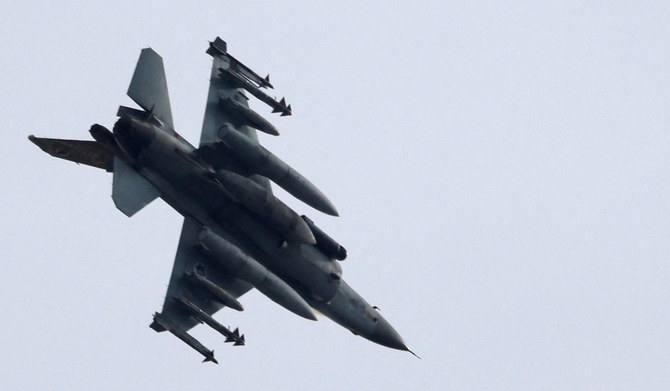BEIRUT: Israel launched missiles at several military targets outside the Syrian capital, Damascus, on Tuesday, Syria’s Defense Ministry said, in what regional intelligence and Syrian sources said were stepped-up strikes on fortifications of Lebanon’s Hezbollah.
Syrian air defenses intercepted Israeli “missiles and shot down some of them,” the ministry said in a statement, adding they caused only material damage.
Two Syrian military sources familiar with the strikes said Israel targeted a Hezbollah ammunition depot near the city of Yabroud in the Qalamoun Mountains, northeast of the Syrian capital.
It was the second strike within 48 hours on the same mountain range that spills over into Lebanon, where the heavily armed Hezbollah has several major supply routes into Syria.
BACKGROUND
Two Syrian military sources familiar with the strikes said Israel targeted a Hezbollah ammunition depot near the city of Yabroud in the Qalamoun Mountains, northeast of the Syrian capital.
Hezbollah and the Israeli military have been trading fire since Hamas stormed southern Israel from the Gaza Strip on Oct. 7, in a steadily intensifying conflict that has fueled concern of wider escalation.
Another strike hit a nearby location near Qutayfah, almost 40 km east of Damascus, within the same stretch of territory where Hezbollah forces are well entrenched, according to a Western intelligence source.
“These latest raids are targeting Hezbollah’s infrastructure in Syria, especially its elaborate fortifications along the Lebanese-Syrian border,” the source who requested anonymity told Reuters. He also referred to a recent strike on the city of Qusayr along the border where Hezbollah maintains security control with checkpoints. An Israeli military spokesperson was not immediately available for comment.
Iran has been a major backer of President Bashar Assad during Syria’s 13-year-old conflict.
Its support for Damascus and Hezbollah has drawn regular Israeli air strikes meant to curb Tehran’s extraterritorial military power.
The Israeli strikes in Syria have killed scores of Hezbollah and militia fighters drawn from a group of pro-Iranian proxy groups present in the eastern outskirts of Damascus and southern and southeastern Syria, Western and regional intelligence sources say.
They say since Oct.7 Israel has expanded both the nature of targets and territorial reach of its attacks to Syrian army encampments in Daraa province in the south, a source of sporadic mortars into Israel’s northern border.
The strikes have focused on the vicinity of the Al-Bukamal border crossing to the east in Deir Ezzor, a major supply route for Iraqi militias in and out of Syria.
Israel has also stepped its missile strikes into the heavily fortified Sayeda Zeinab neighborhood of the capital where a major shrine is located, and high-ranking militia leaders are known to have headquarters, both Syrian and Western intelligence sources say.
At least half a dozen Iranian Revolutionary Guards officers, mostly in the Sayeda Zainab area, along with several Hezbollah cadres were killed in the strikes.
Hezbollah says at least 20 of its fighters have been killed in Syria since Oct. 7.
The conflict marks the worst hostilities between Hezbollah and Israel since they fought a war in 2006, commonly known in Lebanon as “the July war.”


























